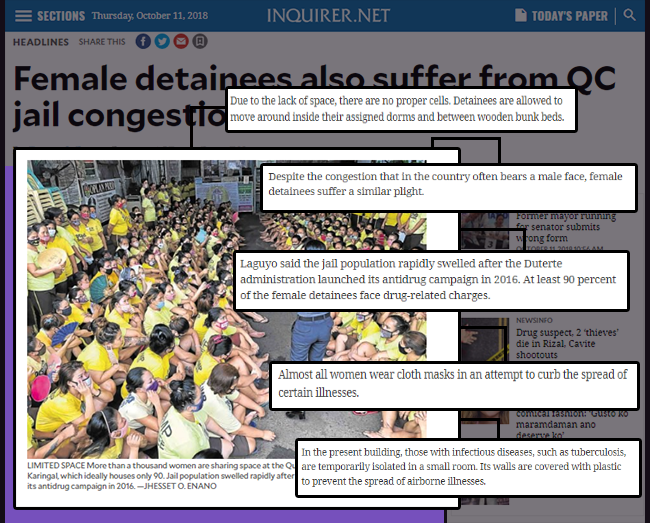Prison Congestion: Focus on Women Detainees

Screengrabs from Inquirer.net.
CHEERS TO the Philippine Daily Inquirer for calling attention to the plight of female detainees in the Quezon City Female Dormitory (QCFD).
In June 2018, the Bureau of Jail Management and Penology (BJMP) noted a congestion rate of 612 percent in Philippine jails. The increase in the number of detainees is largely due to the high number of drug suspects arrested during anti-illegal drug operations. The media have flagged the general state of congestion and its attendant health and sanitation problems, some calling for more penal farms and rehabilitation facilities to house the growing number of prisoners in the country’s jails.
On October 8, the Inquirer focused its news lens to reveal the worsening situation for female detainees in the Quezon City jails, with a congestion rate of 1,014 percent. The report noted that more than 1,200 women detainees share space for 90 people in a two-story facility divided into three “dormitories”. (“Female detainees also suffer from QC jail congestion“)
According to the report, “Due to lack of space there are no proper cells…” and “With no mess hall, they eat their meals in their ‘dormitories.’” The women detainees have to wear surgical masks to prevent the spread of diseases, while prisoners with infectious diseases like tuberculosis are held in a small room with plastic-covered walls.
The Quezon City government has been constructing since 2017 a four-story additional facility which should be functional by January 2019. The Inquirer report noted that the facility will hold more than 600 detainees, but will reduce the congestion only by half. The same facility will have a clinic, a canteen, a multipurpose hall, and a laundry area.
Media have covered the issue with thought-provoking photos and videos on the subject. The Inquirer story added a new perspective to the coverage as most of the reports have focused on male prisoners.
The QCFD is just one of the local women correctional facilities in the country with issues that have to be addressed. There are seven major correctional institutions for women in the country. The media should check out the conditions in these as well.
Leave a Reply